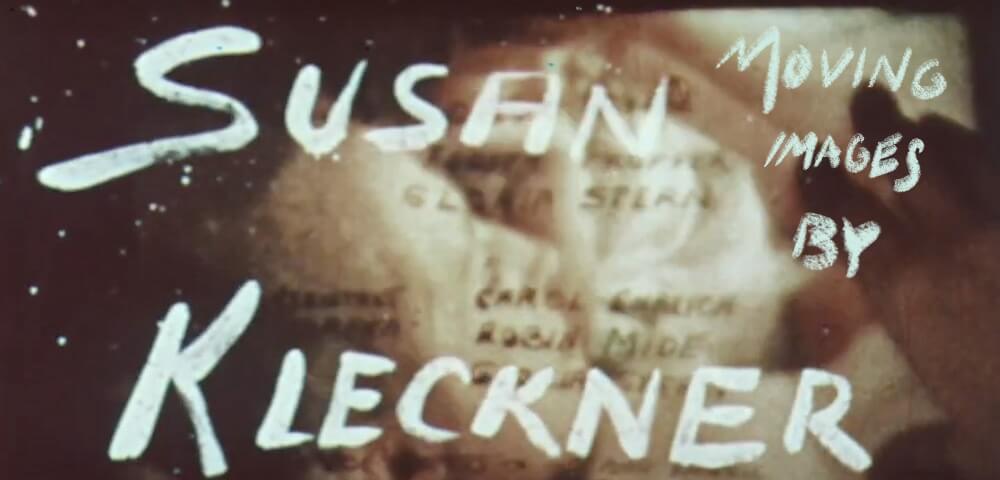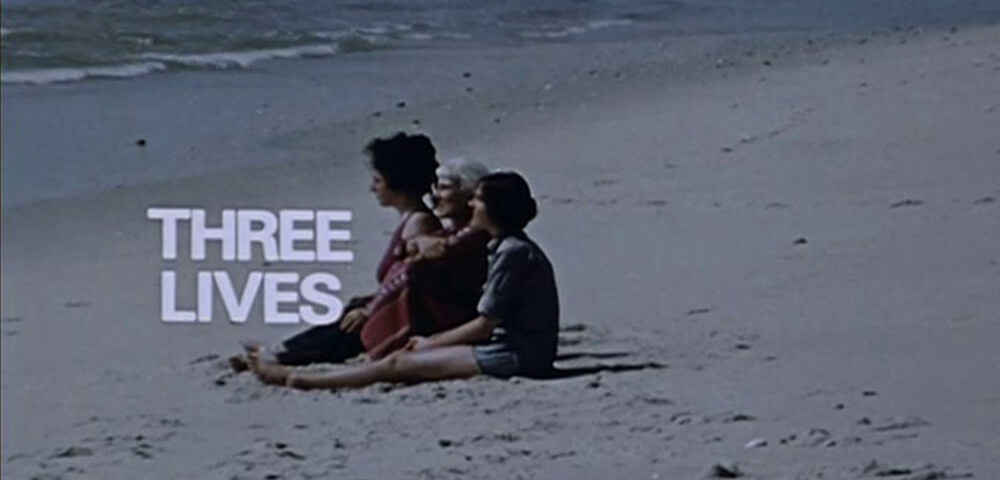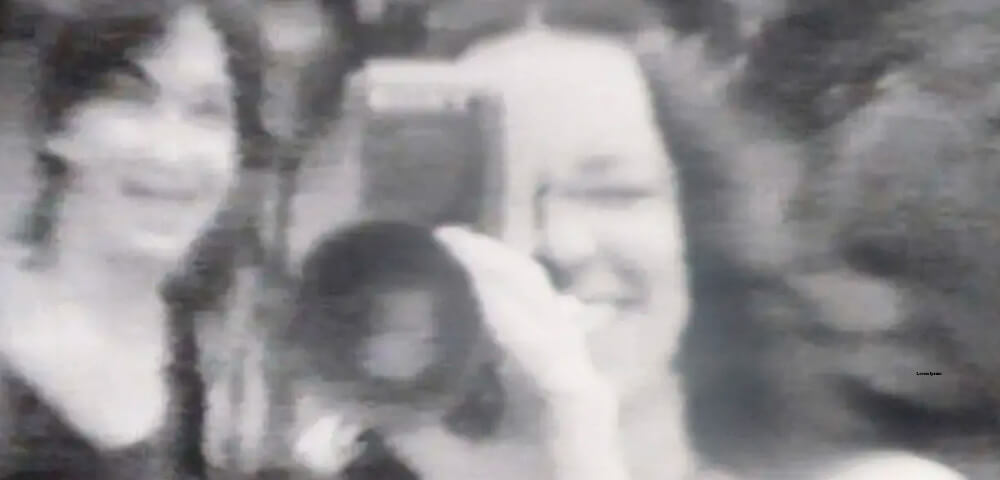
This November, Spectacle is pleased to present a selection of films and a groundbreaking video made by and with Susan Kleckner, a pioneering filmmaker, photographer, performance artist, activist, and lifelong New Yorker who helped to define the Feminist Arts Movement.
Across disciplines, Kleckner worked individually and within groups to make art to empower the voices of women and minorities and as a tool for social progress. She was essential in uniting Women Artists in Revolution (WAR) with Feminists in the Arts in 1969, and in 1970 she became a founder of the Women’s Interart Center, a trailblazing alternative space that provided exhibition and training for women in a wide range of media arts. Over the next decade, she experienced her most fruitful period of cinematic production, making vital contributions to collective work alongside a handful of self-directed projects, which span documentary, fiction, experimental, and hybrid modes. Though this series just scratches the surface of her prolific output as a visual artist, it highlights the key moving image-based work from this stretch, shown together for the very first time.
Join us on Sunday, November 3rd for a special collection of Kleckner’s short films followed by ANOTHER LOOK (AT THE MIAMI CONVENTION), a timely, yet forgotten artifact of feminist media activism that intervenes into the 1972 Democratic National Convention. The evening will conclude with a Q&A with William Kaizen, author of Against Immediacy: Video Art and Media Populism.

THREE LIVES
dir. Susan Kleckner, Louva Irvine, Robin Mide, & Kate Millett, 1971.
United States, 70 min.
In English.
FRIDAY, NOVEMBER 1 – 5:00PM
THURSDAY, NOVEMBER 7 – 7:30PM
FRIDAY, NOVEMBER 22 – 10PM
WEDNESDAY, NOVEMBER 27 – 10PM
“Born of the then thriving personal-is-political impulse, Three Lives records a specific moment in another era yet still remains vital and absorbing today.” – Melissa Anderson, Artforum
The first feature length film produced by an all-female crew, THREE LIVES is a landmark documentary that explores the distinctive experiences of three “ordinary” white women living in America. The subjects include Kate Millet’s younger sister, Mallory Millett-Jones, who recently left her husband for an independent lifestyle in New York City; Lillian Shreve, a middle-aged chemist married contently for twenty-three years; and Robin Mide, a twenty-one-year-old queer artist and activist from Rockaway, Queens. Through candid interviews shot on grainy 16mm film stock, the film evokes solidarity between their varied backgrounds and effectively suggests that the most intimate, everyday experiences are infused with resounding political implications. Often credited solely to Millett, whose seminal text Sexual Politics funded part of its production, THREE LIVES is, in fact, a work of collective filmmaking. As co-director of the film and co-founder of the Women’s Liberation Cinema, Susan Kleckner’s intersectional, careful touch is essential to its lasting resonance.

ANOTHER LOOK (AT THE MIAMI CONVENTION)
Dir. Women’s Video News Service, 1972.
United States, 56 min.
In English.
SUNDAY, NOVEMBER 3 – 7:30PM (W/Q&A)
FRIDAY, NOVEMBER 8 – 5:00PM
TUESDAY, NOVEMBER 12 – 10PM
FRIDAY, NOVEMBER 22 – MIDNIGHT
Shortly after THREE LIVES, Kleckner joined another team of feminist filmmakers to produce the first all-woman broadcast television production, ANOTHER LOOK (AT THE MIAMI CONVENTION). Made by the Women’s Video News Service (WVNS), which included Kleckner, Wendy Appel, Pat de Pew, Mary Feldbauer, Carolyn Kreski, and Rita Ogden, ANOTHER LOOK covers the 1972 Democratic National Convention and the presidential candidacy of Shirley Chisholm, the first African American and the first woman to run for the Democratic nomination. Employing reflexive reportage that calls attention to their role in the video’s construction (itself a political statement), Kleckner and the crew center the voices most marginalized by mainstream coverage. Queer, Black, indigenous, and working-class perspectives are featured prominently alongside major figures of the women’s rights movement, such as Betty Friedan, Gloria Steinem, and Bella Abzug, as well as the era’s counter cultural milieu. Almost entirely forgotten and never screened in a traditional context, this rare document belongs in the canon of great works of media activism and, somewhat painfully, is as radical today as it was in 1972.

SHORTS PROGRAM
Dir. Susan Kleckner, 1973-1981.
United States, 65 min.
In English.
SUNDAY, NOVEMBER 3 – 5:00PM
Following her integral role in the collective efforts of THREE LIVES and ANOTHER LOOK, Kleckner began work on her first self-directed project, BIRTH FILM. A moving and intensely intimate verité documentary about a live, at-home birth, the film drew controversy upon its initial premier at the Whitney Museum in 1973, where viewers were reported to have become sick due to its graphic content. Hurt by this shortsighted reception, Kleckner took several years off from filmmaking. She returned with a string of remarkable 16mm shorts, represented in this program by AMAZING GRACE, BAG LADY FILM, and PIERRE FILM. Virtually impossible to see individually, let alone together, each work further displays her lifelong investments in performance, social justice, women’s rights, and alternative living.
AMAZING GRACE
Dir. Susan Kleckner, 1981.
United States, 4min.
In English.
Scene one of an unfinished project, AMAZING GRACE captures the quotidian routine of a homeless woman (prolific film and stage actress, Lynne Thigpen) as she awakes inside of a train car. With the titular tune as soundtrack, it questions the notion of “freedom” and who can claim it.
BAG LADY FILM
Dir. Susan Kleckner, 1976.
United States, 16min.
In English.
Adapting the aesthetics of cinema’s silent era, this short is a thematic precursor to AMAZING GRACE that follows a vagabond woman (Dale Soules) living on the fringes of society. The subject revels in a range of disobedient behavior and, without romanticization, points to how one might live outside of mainstream structures.
PIERRE FILM
Dir. Susan Kleckner, 1977.
United States, 13min.
In English.
An abstract evocation of rhythm and movement conveyed through superimposed ebbing tides, classical string performances, and an impassioned political speech.
BIRTH FILM
Dir. Susan Kleckner, 1973.
United States, 33min.
In English.
At once a statement on bodily autonomy and a counter to the abhorrent state of the American medical system, BIRTH FILM captures a woman, Kirstin Booth Glen, giving birth to a son in her home in New York City. Kleckner applies a tense, yet sensitive form to the film’s extended, explicit live-birth sequence, which is introduced by socially incisive commentary from Kirstin and her husband, Jeffrey. The Glens, both lawyers who fight for reproductive rights, view their decision to forgo a hospital to be as political as it is personal.
Special thanks to Lucie Bonvin (Documentaire sur grand écran), Jesse Pires (Lightbox Film Center), Bill Kaizen (UMass Amherst), Jeremy Smith (UMass Amherst), Sonya Milton, Linda Cummings, Paula Allen, and Susan Jahoda.
